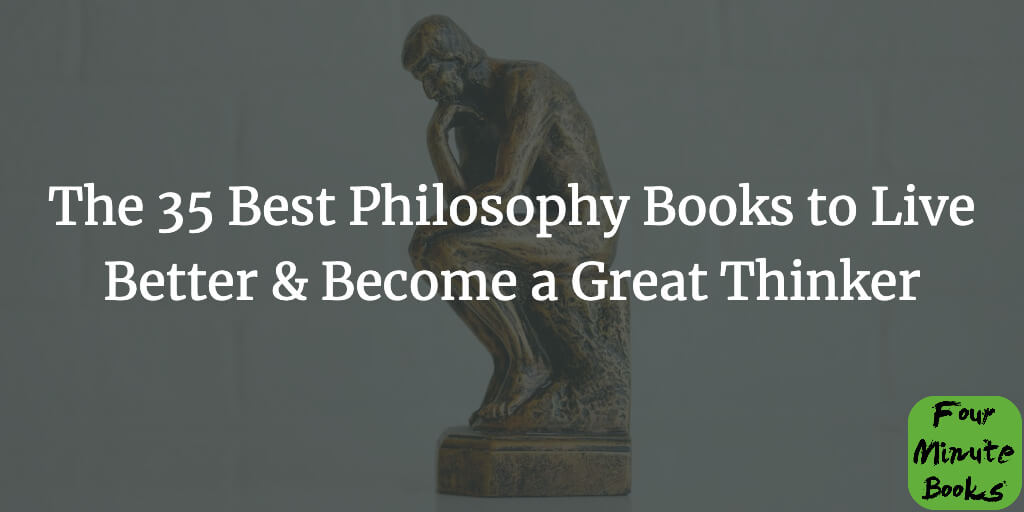
I used to think philosophy meant sitting in a college auditorium, reading boring old texts in languages no one speaks anymore. When I was 23, however, I discovered Ryan Holiday and his work on Stoicism. I read his book The Obstacle Is the Way, and I realized I couldn’t have been more wrong. Philosophy is not about analyzing the thoughts of people who died long ago. It’s about how to live a good life, right here, right now — and that’s exactly what philosophy books are for.
We’ve summarized over 1,000 books here at Four Minute Books. Today, we’ll compile the best philosophy titles for you. Whether you’re a beginner or a philosophy expert, we’re sure you’ll find a book on here that’ll teach you something new. Find a strong set of guiding principles, discover where it came from, and adjust it to your own and modern life.
As usual, we’ve sorted our list into multiple sub-categories. First, we’ll cover the best philosophy books all around. Then, we’ll get into Western philosophy, Eastern philosophy, important philosophers, as well as books talking specifically about ethics and morality. Finally, we’ll show you some “philosophies of productivity” and other books that present a coherent worldview for our modern world.
Besides a picture of the cover of each title, you’ll find our favorite quote from the author, a one-sentence-summary of the book, and some suggestions on when and why to read the book. We’ve also included three key takeaways, as well as some buttons you can click to read the book’s free summary on Four Minute Books or buy a copy for yourself on Amazon (affiliate links).
Use the clickable table of contents below to quickly jump to any book or category, and start discovering the many wonderful, enlightening philosophies we can use to live a better life!
Here are the 35 best philosophy books of all time!
Table of Contents
- Best Philosophy Books Overall
- Best Philosophy Books About Stoicism and Western Philosophy
- 8. Letters from a Stoic by Seneca
- 9. Meditations on First Philosophy by René Descartes
- 10. On the Shortness of Life by Seneca
- 11. A Guide to the Good Life by William B. Irvine
- 12. How to Be a Stoic by Massimo Pigliucci
- 13. How to Think Like a Roman Emperor by Donald Robertson
- 14. The Obstacle Is the Way by Ryan Holiday
- Best Philosophy Books About Eastern Philosophy
- Best Books About Important Philosophers
- Best Philosophy Books About Ethics & Morality
- Best Philosophy Books for Productivity
- Best Philosophy Books for Modern Life
- Conclusion
- Other Book Lists by Topic
- Other Book Lists by Author
Best Philosophy Books Overall
1. Meditations by Marcus Aurelius
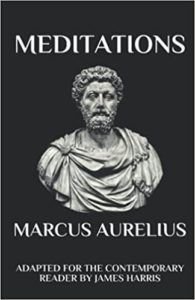
Favorite Quote
“You have power over your mind — not outside events. Realize this, and you will find strength.” — Marcus Aurelius
The Book in One Sentence
Meditations is a collection of 12 books written by Roman emperor Marcus Aurelius, who consistently journaled to remember his education in Stoic philosophy, and whose writings will teach you logic, faith, and self-discipline.
Why should you read it?
If you’re looking for daily comfort, motivation, and wisdom, this is one of the best books you’ll ever pick up. I don’t see why anyone shouldn’t read this. The advice is as sound as when Marcus gave it to himself 2,000 years ago, and the book will benefit you in tough as well as glorious times. Plus, it might even inspire you to start journaling yourself!
Key Takeaways
- True “logic” doesn’t always make sense, but everything happens for a reason.
- Life is too short to complain.
- The only pain you suffer is the pain you create yourself.
If you want to learn more, you can read our free four-minute summary or get a copy for yourself.
_____
2. Man’s Search for Meaning by Viktor Frankl
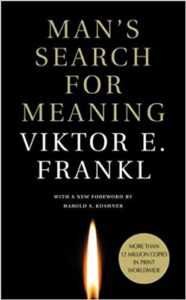
Favorite Quote
“Everything can be taken from a man but one thing: the last of the human freedoms — to choose one’s attitude in any given set of circumstances, to choose one’s own way.” — Viktor Frankl
The Book in One Sentence
Man’s Search for Meaning details holocaust survivor Viktor Frankl’s horrifying experiences in Nazi concentration camps, along with his psychological approach of logotherapy, which is also what helped him survive and shows how you can – and must – find meaning in your life.
Why should you read it?
There are few holes this book couldn’t make you crawl back out from. Beyond inspiring you to rethink meaning and find it wherever you go, however, it will also instill tremendous respect in you for those who’ve come before us. This book is enlightening on both a personal and a historical level, and I think almost anyone would benefit from reading it.
Key Takeaways
- Sometimes, the only way to survive is to surrender to death.
- Your life has its own meaning, and it’s up to you to find it.
- Use paradoxical intention to make your fears go away.
If you want to learn more, you can read our free four-minute summary or get a copy for yourself.
_____
3. The Daily Stoic by Ryan Holiday
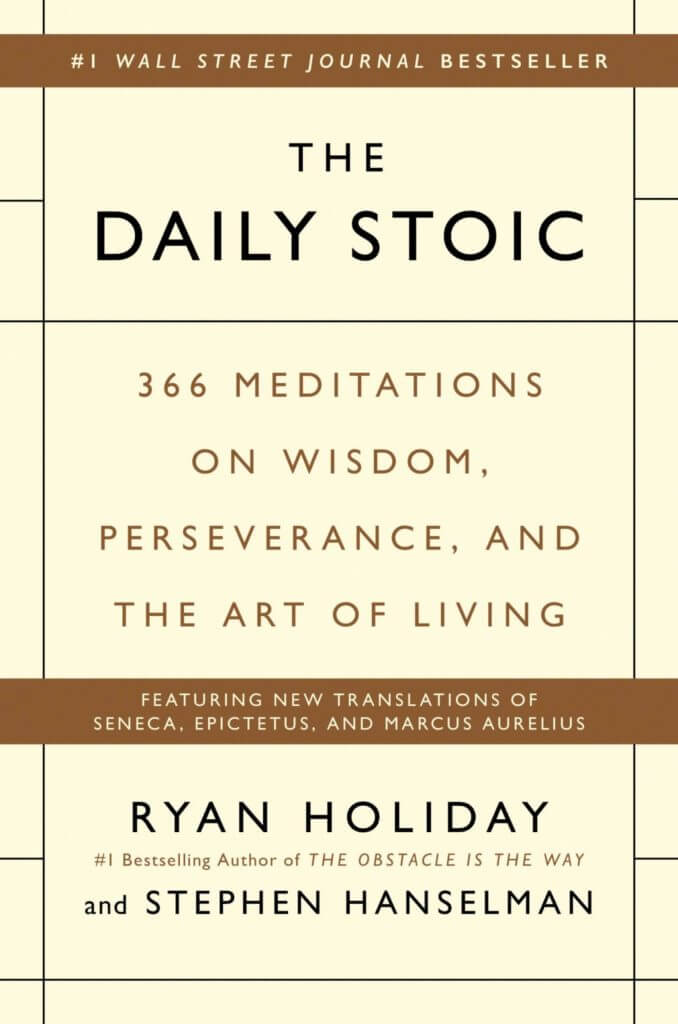
Favorite Quote
“Control your perceptions. Direct your actions properly. Willingly accept what’s outside your control.” — Ryan Holiday
The Book in One Sentence
The Daily Stoic is a year-long compilation of short, daily meditations from ancient Stoic philosophers, like Seneca, Epictetus, and Marcus Aurelius, teaching you equanimity, resilience, and perseverance via the three Stoic disciplines of perception, action, and will.
Why should you read it?
If you struggle with reading non-fiction at a pace that makes you feel good about your progress, this is the book for you. It’s also one of my all-time favorites. I read it every year for five years in a row. A page a day is so easy to read, you can’t not do it. As a result, you’ll gain a great overview of Stoicism and implement plenty of its tenets in your life.
Key Takeaways
- Perception gives purpose to your thoughts, actions, and ultimately everything you do.
- We can change the course of our life by actively choosing our actions instead of just reacting to our impulses.
- Will is our internal force of perseverance, ready to give us hope when everything else fails.
If you want to learn more, you can read our free four-minute summary or get a copy for yourself.
_____
4. The Story of Philosophy by Will Durant
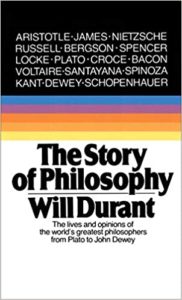
Favorite Quote
“Civilization begins with order, grows with liberty, and dies with chaos.” — Will Durant
The Book in One Sentence
The Story of Philosophy profiles the lives of great Western philosophers, such as Plato, Socrates, and Nietzsche, exploring their views on politics, religion, morality, the meaning of life, and plenty of other important concepts.
Why should you read it?
If you’re curious about the origins of philosophy, this is the definitive title to read. Durant and his wife are some of the greatest historians who ever lived, and they fantastically condensed the world’s story, in this case down to 700 pages. If you want to start with something shorter, grab The Lessons of History first, then go deeper on each of history’s most important philosophers in this masterpiece.
Key Takeaways
- Ancient Greek philosophers paved the way for philosophy, science, and new forms of societal governance.
- Philosopher Spinoza helped decipher the hidden meanings of religion.
- Voltaire was partially responsible for the French revolution and the improvement of political systems around the world.
If you want to learn more, you can read our free four-minute summary or get a copy for yourself.
_____
5. The Republic by Plato
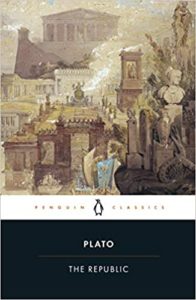
Favorite Quote
“The heaviest penalty for declining to rule is to be ruled by someone inferior to yourself.” — Plato
The Book in One Sentence
The Republic is one of the most important political and philosophical works in history, written by Plato, the archetypal philosopher and one of Socrates’ students, in the form of a dialogue about justice and political systems.
Why should you read it?
If you’re in politics, this is a must-read. If not, it’s still a valuable read on what it means to be governed, how to be a good citizen, and why philosophers can be good rulers but don’t necessarily will be. All-around a classic worth picking up.
Key Takeaways
- Justice must be looked at on an individual as well as a city level.
- Both cities and souls can be divided into three distinct parts.
- Philosophers trying to rule others will face lots of difficulty, and rightfully so.
If you want to learn more, you can read our free four-minute summary or get a copy for yourself.
_____
6. Discourses by Epictetus
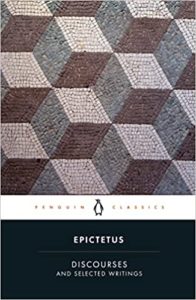
Favorite Quote
“What else is freedom but the power to live our life the way we want?” — Epictetus
The Book in One Sentence
Discourses is a collection of ancient philosopher Epictetus’ lectures, transcribed by one of his students, helping us make sense of the world and teaching us to accept hardship, change, and life events that feel like setbacks at first but will ultimately make us stronger.
Why should you read it?
Unlike most of the other ancient philosophers, Epictetus didn’t start from wealth. He was a slave, but thanks to his ideas and behavior, he was set free. He lived frugally till the end of his days, and that’s why his lectures are full of common sense. If you want an original take on Stoicism that didn’t come from a point of privilege, this is your best bet.
Key Takeaways
- Without life’s challenges, we wouldn’t feel the need to grow and evolve.
- Everything great in life takes time and effort to build.
- If you can’t control it, don’t stress over it.
If you want to learn more, you can read our free four-minute summary or get a copy for yourself.
_____
7. The Last Lecture by Randy Pausch
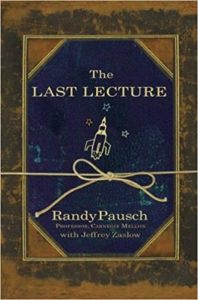
Favorite Quote
“If I only had three words of advice, they would be, ‘tell the truth.’ If I got three more words, I’d add, ‘all the time.’” — Randy Pausch
The Book in One Sentence
The Last Lecture is a college professor’s final message to the world before his impending death of cancer at a relatively young age, offering meaningful life advice, significant words of wisdom, and a great deal of optimism and hope for humanity.
Why should you read it?
Imagine your favorite school teacher or mentor were to give one last lecture before they died. Wouldn’t you attend? Well, Randy Pausch may not be your favorite college professor, but he probably will be if you give his last lecture a chance. The book is full of inspiration, hard-gained wisdom, and memories that will make you smile. Randy also gave the actual lecture, of course, but I recommend reading the book first. It holds more detail and makes the talk feel a lot stronger.
Key Takeaways
- If you never give up on your dreams, eventually, some of them will come true.
- True satisfaction comes from helping others succeed.
- The simplest advice is often the most valuable.
If you want to learn more, you can read our free four-minute summary or get a copy for yourself.
_____
Best Philosophy Books About Stoicism and Western Philosophy
8. Letters from a Stoic by Seneca
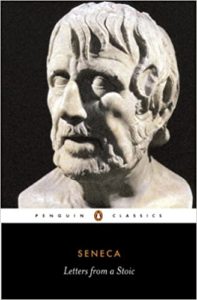
Favorite Quote
“If you really want to escape the things that harass you, what you need is not to be in a different place but to be a different person.” — Seneca
The Book in One Sentence
Letters from a Stoic is a collection of encouraging moral messages sent by Roman Stoic and philosopher Seneca to his friend Lucilius in order to help him become less emotional, more disciplined, and find the good life.
Why should you read it?
There used to be a thing called “pen pals.” People would commit to writing each other letters on a regular basis. Nowadays, the practice is dwindling. Thanks to this book, however, you can have a pen pal, and not just any pen pal but one of the most famous philosophers in history. If you’d like a friend to send you letters of encouragement, this book is perfect for you.
Key Takeaways
- The goal of attaining wisdom is to live in harmony with nature.
- Your most valuable possession is your mind.
- A wise man doesn’t need friends, but he chooses to make them anyway.
If you want to learn more, you can read our free four-minute summary or get a copy for yourself.
_____
9. Meditations on First Philosophy by René Descartes
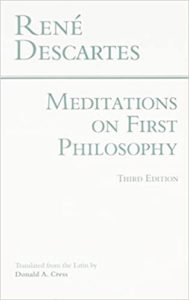
Favorite Quote
“Dubium sapientiae initium — Doubt is the origin of wisdom.” — René Descartes
The Book in One Sentence
Meditations on First Philosophy is one of the premier works of Western philosophy, written by René Descartes in 1641, prompting us to abandon everything that can possibly be doubted and then starting to reason our way forward based only on what we can know with absolute certainty.
Why should you read it?
Are you a person driven by logic and reason? Then this is the philosophy book for you. Descartes’ approach of starting from what’s 100% true and then going from there is fascinating. If you’d like to test your reasoning skills and aren’t afraid of someone challenging your assumptions, read this book.
Key Takeaways
- Your senses don’t always tell the truth.
- The fact that you think proves that you exist.
- There are three levels of truth in the world.
If you want to learn more, you can read our free four-minute summary or get a copy for yourself.
_____
10. On the Shortness of Life by Seneca
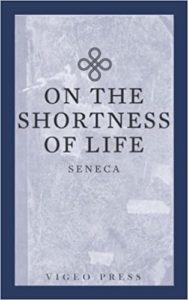
Favorite Quote
“People are frugal in guarding their personal property; but as soon as it comes to squandering time they are most wasteful of the one thing in which it is right to be stingy.” — Seneca
The Book in One Sentence
On the Shortness of Life is a 2,000 year old, 20-page masterpiece by Seneca, Roman Stoic philosopher and teacher to the emperors, about time and how to best use it to ensure you lead a long and fulfilling life.
Why should you read it?
There are a million talks, books, and celebrities out there telling us that “life is short.” But, honestly, no one ever said it better than Seneca in this short read. You’ll find yourself making highlight after highlight. It’s amazing and, productivity-wise, probably the only book you’ll ever have to read.
Key Takeaways
- Chasing leisure, luxury, and legacy is what makes a long life appear short.
- You can be busy all your life without ever doing something meaningful, so beware.
- Your ability to contemplate and appreciate life will never disappear.
If you want to learn more, you can read our free four-minute summary or get a copy for yourself.
_____
11. A Guide to the Good Life by William B. Irvine
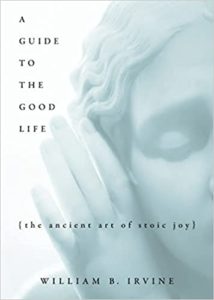
Favorite Quote
“The easiest way for us to gain happiness is to learn how to want the things we already have.” — William B. Irvine
The Book in One Sentence
A Guide to the Good Life is a roadmap for aspiring Stoics, revealing why this ancient philosophy is useful today, what Stoicism is truly about, and showing you how to cultivate its powerful principles in your own life.
Why should you read it?
If you’re looking for a general introduction to Stoicism, get this book. It covers its historical rise and fall, most important concepts, as well as the best pieces of Stoic advice. A great overview of this resurgent philosophy.
Key Takeaways
- The two primary values of Stoicism are virtue and tranquility.
- Learn to want what you already have.
- Immediately accept things that are outside of your control, and focus on what you can do with what you’ve got.
If you want to learn more, you can read our free four-minute summary or get a copy for yourself.
_____
12. How to Be a Stoic by Massimo Pigliucci
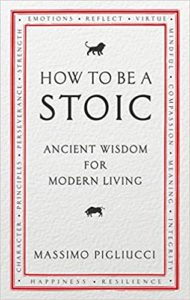
Favorite Quote
“Better to endure pain in an honorable manner than to seek joy in a shameful one.” — Massimo Pigliucci
The Book in One Sentence
How to Be a Stoic is a practical guide for applying ancient philosophy in modern life, covering the principles philosophers like Socrates, Epictetus, and Cato followed to cultivate strength in the three Stoic disciplines of desire, action, and assent.
Why should you read it?
For a deeper dive into Stoicism and its central areas of application, consider this book. Like many other books on the topic, it divides its ideas into three section mapping to the three Stoic disciplines, so even if you’re just looking for advice on one particular field, you can easily skip around and get right to what’s most relevant to you right now.
Key Takeaways
- The concept of “preferred indifferents” can help you act in line with your morals without becoming extremist.
- In Stoicism, virtue is the highest good, and it’s made up of four values.
- You can have useful, pleasurable, and good friendships. The good are the most important.
If you want to learn more, you can read our free four-minute summary or get a copy for yourself.
_____
13. How to Think Like a Roman Emperor by Donald Robertson
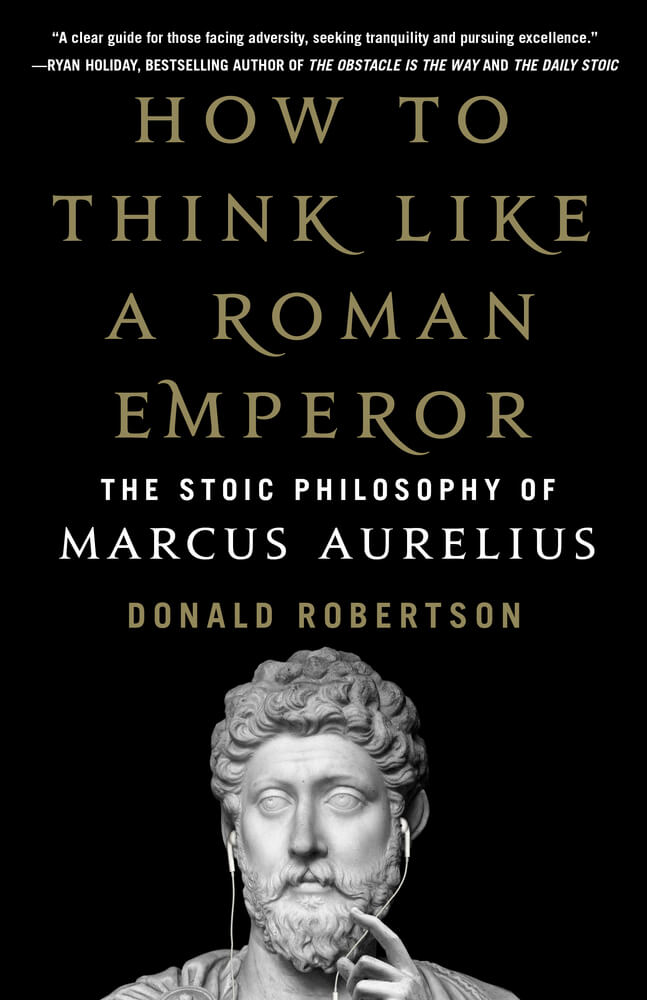
Favorite Quote
“What matters, in other words, isn’t what we feel but how we respond to those feelings.” — Donald Robertson
The Book in One Sentence
How to Think Like a Roman Emperor combines the story of famous Stoic and Roman emperor Marcus Aurelius with lessons from modern psychology to help you become more emotionally resilient and develop the strength to overcome even the most challenging circumstances.
Why should you read it?
If you prefer learning from stories, this is a great book for you. Robertson releases the ideas behind Stoicism slowly, rolling them out alongside Marcus’ life story, adding insight into modern psychology along the way. The result is an effortless read that makes for fantastic insights without feeling like a typical non-fiction book.
Key Takeaways
- We come from nature, and we’ll return to it eventually, so it’s only logical to live in agreement with it.
- Life is about constant improvement, which is why we should all work on our virtues every day.
- Stoics know there’s no point in worrying over what you can’t control, so best just make your peace with it.
If you want to learn more, you can read our free four-minute summary or get a copy for yourself.
_____
14. The Obstacle Is the Way by Ryan Holiday
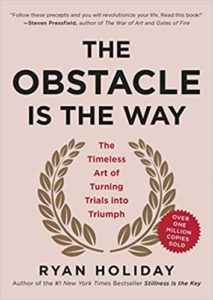
Favorite Quote
“There is no good or bad without us, there is only perception. There is the event itself and the story we tell ourselves about what it means.” — Ryan Holiday
The Book in One Sentence
The Obstacle Is the Way will help you endure the struggles of life with grace and resilience, thanks to lessons drawn from ancient heroes, former presidents, modern actors, and successful athletes and how they turned adversity into success thanks to the powers of perception, action, and will.
Why should you read it?
If you think, “Well, all this stuff about Stoicism is great, but what does it look like today?” then this title, and of course Ryan Holiday’s other books, are a great place to start. Ryan can be largely credited with bringing Stoicism back to life, and he does it with countless examples from modern-world leaders, athletes, and celebrities embodying Stoic ideals. The first of three books in his original trilogy on Stoicism, you’ll want to read Ego Is the Enemy and Stillness Is the Key next.
Key Takeaways
- Imagine you’re advising yourself as a friend to keep an objective perspective.
- Large obstacles have large weaknesses – identify them and use them against them.
- Use your will to accept what you cannot change and change the things you can.
If you want to learn more, you can read our free four-minute summary or get a copy for yourself.
_____
Best Philosophy Books About Eastern Philosophy
15. The Bhagavad Gita by Vyasa
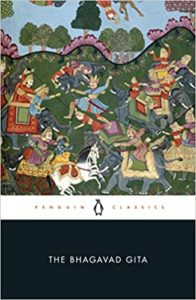
Favorite Quote
“It is better to live your own destiny imperfectly than to live an imitation of somebody else’s life with perfection.” — Vyasa
The Book in One Sentence
The Bhagavad Gita is the number one spiritual text in Hinduism, packed with wisdom about life and purpose as well as powerful advice on living virtuously but authentically without succumbing to life’s temptations or other people’s dreams.
Why should you read it?
You don’t have to be Hindu to appreciate Hindu wisdom. Philosophy works best when you balance multiple perspectives, and though, as readers have told me, it’s very hard for outsiders to fully grasp “the Gita,” it still provides valuable counterpoints worth studying.
Key Takeaways
- Living life doing what you were destined to do brings peace, while the opposite breeds pain and insecurity.
- Find meaning in the journey and let go of constant anticipation.
- Meditation can help you master your thoughts and regain focus.
If you want to learn more, you can read our free four-minute summary or get a copy for yourself.
_____
16. The Art of War by Sun Tzu
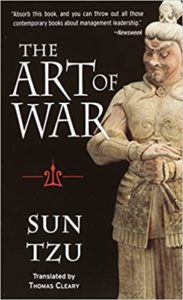
Favorite Quote
“Victorious warriors win first and then go to war, while defeated warriors go to war first and then seek to win.” — Sun Tzu
The Book in One Sentence
The Art of War is considered the definitive text on military strategy and warfare, written in ancient China around 500 BC, inspiring businesses, athletes, and of course generals to beat their opponents and competition the right way.
Why should you read it?
If you’re looking for a highly action-oriented approach to philosophy, this classic might be for you. It’s a book about war, yes, but it’s also a book about business, work, and life. If you metaphorically apply Sun Tzu’s strategies of warfare to your next big meeting, it might go better than you expect. You’ll also pick up plenty of honorable attitudes along the way, as the soldier’s path is, ideally, supposed to be a virtuous one — and it’s walking that path that this book hopes to teach you.
Key Takeaways
- Only enter battles you know you can win.
- Deceive your competition to make them do what you want.
- Lead your team as if you were leading a single man by the hand.
If you want to learn more, you can read our free four-minute summary or get a copy for yourself.
_____
17. The Tao Te Ching by Lao Tzu
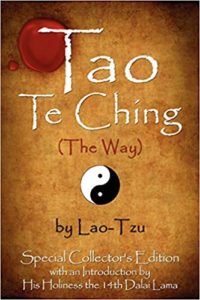
Favorite Quote
“If you realize that all things change, there is nothing you will try to hold on to.” ― Lao Tzu
The Book in One Sentence
The Tao Te Ching is a collection of 81 short, poignant chapters full of advice on living in harmony with “the Tao,” translated as “the Way,” an ancient Chinese interpretation of the spiritual force underpinning all life, first written around 400 BC but relevant to this day.
Why should you read it?
Whereas Western philosophy is focused more on the self and dealing with the outside world, Eastern philosophy promotes harmony and being part of the world. Few books encapsulate this Eastern approach more appropriately than this book. Plus, at 81 short chapters, it’s an easy and quick read full of great life advice. Definitely another one for your must-read shelf!
Key Takeaways
- Fully accept whatever the current moment brings. Give yourself fully to reality.
- Admit your own faults and mistakes, because ultimately, they might be your greatest source of strength.
- Always compete in a spirit of play to stay in harmony with the Tao.
If you want to learn more, you can read our free four-minute summary or get a copy for yourself.
_____
18. The Book of Joy by Dalai Lama & Desmond Tutu
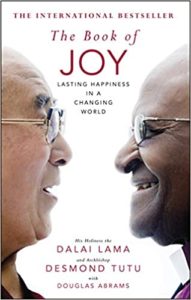
Favorite Quote
“The more time you spend thinking about yourself, the more suffering you will experience.” — Dalai Lama & Desmond Tutu
The Book in One Sentence
The Book of Joy is the result of a 7-day meeting between the Dalai Lama and Desmond Tutu, two of the world’s most influential spiritual leaders, during which they discussed one of life’s most important questions: how do we find joy despite suffering?
Why should you read it?
When two globally revered spiritual leaders talk, it’s worth paying attention. When they discuss handling suffering as an essential life skill (because suffering is inevitable), you might want to drop everything else and listen for a while. This one probably works really well as an audiobook too. If you’re looking for more joy in your life, get this one.
Key Takeaways
- A life without suffering does not exist.
- Since we can’t control suffering, we must practice our response to it.
- Compassion and sadness help us alleviate our troublesome responses to suffering.
If you want to learn more, you can read our free four-minute summary or get a copy for yourself.
_____
Best Books About Important Philosophers
19. Lives of the Stoics by Ryan Holiday
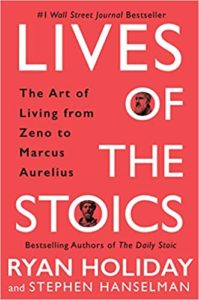
Favorite Quote
“There is no better definition of a Stoic: to have but not want, to enjoy without needing.” — Ryan Holiday
The Book in One Sentence
Lives of the Stoics takes a deep dive into the experiences and beliefs of some of the earliest philosophers practicing the four Stoic virtues of courage, temperance, justice, and wisdom.
Why should you read it?
If you’re already on the Stoicism-train but want to know more about the most important Stoic philosophers’ lives, this book is for you. Beyond just the most important Stoic ideas, you’ll also find plenty of anecdotes and details about the lives of Epicurus, Seneca, Marcus Aurelius, and others. If you like biographies, you’ll enjoy this book.
Key Takeaways
- Stoicism came about as a result of extreme hardship.
- Not everyone who initially followed Stoicism fully lived up to its standards.
- Marcus Aurelius was a Roman emperor whose practice of Stoicism helped him lead with compassion and humility.
If you want to learn more, you can read our free four-minute summary or get a copy for yourself.
_____
20. Plato at the Googleplex by Rebecca Goldstein
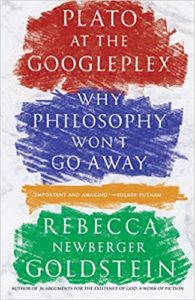
Favorite Quote
“If we don’t understand our tools, then there is a danger we will become the tool of our tools.” — Rebecca Goldstein
The Book in One Sentence
Plato at the Googleplex asks what would happen if ancient philosopher Plato were alive today and came in contact with the modern world, for example by touring Google’s headquarters, and what the implications of his encounters are for the relevance of philosophy in our civilized, hyper-technological world.
Why should you read it?
Are you skeptical that philosophy still has a place in the modern world? Then this book provides the perfect thought experiment. If Plato were on a speaking tour today, what would he tell us? This book combines the fun of a novel with the insight of a history book, and the result is a trip you’ll never forget! Perhaps, it might even change your mind.
Key Takeaways
- Google can answer most questions but not all of them.
- No two people are the same, and neither should education treat them that way.
- Plato came up with a definition of love that encompasses all human relationships.
If you want to learn more, you can read our free four-minute summary or get a copy for yourself.
_____
21. Breakfast With Socrates by Robert Rowland Smith
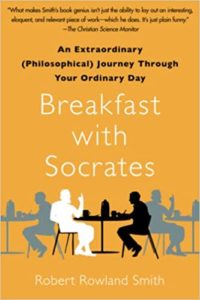
Favorite Quote
“You can’t be free to be right unless you can free to be wrong.” — Robert Rowland Smith
The Book in One Sentence
Breakfast With Socrates takes you through an ordinary day in the company of extraordinary minds, linking each hour of the day and its activity to the core ideas of one of history’s great philosophers, such as Descartes, Nietzsche, or Socrates.
Why should you read it?
If you’re looking for an easy, extremely practical introduction to philosophy, look no further. From breakfast to going to work to falling asleep at night, this book will paint a philosophical backdrop for plenty of familiar everyday situations. Then, it will fill said backdrop with the wisdom of one of history’s great philosophers. What a wonderful concept for a book!
Key Takeaways
- Philosophy isn’t about spinning your head all day; it’s about making wise decisions.
- Your morning routine is a battle of the egos.
- A good way of assessing your happiness is to ask yourself if you’d like to live the same life again.
If you want to learn more, you can read our free four-minute summary or get a copy for yourself.
_____
Best Philosophy Books About Ethics & Morality
22. The Nicomachean Ethics by Aristotle
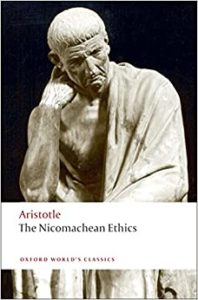
Favorite Quote
“Whosoever is delighted in solitude is either a wild beast or a god.” — Aristotle
The Book in One Sentence
The Nicomachean Ethics is a historically important text compiling Aristotle’s extensive discussion of existential questions concerning happiness, ethics, friendship, knowledge, pleasure, virtue, and even society at large.
Why should you read it?
This one’s for nerds and philosophy geeks like me. Even modern translations still aren’t always super easy to understand, and you’ll have to reread sentences all the time. That said, there is something about reading an original text that makes it feel more special than even the best second-hand reporting. If you want to be able to claim you’ve actually read Aristotle, get yourself a copy of this book.
Key Takeaways
- Aim to achieve a state of eudaimonia instead of conventional happiness.
- Arete, or virtue, is accomplished through a lifetime of work.
- Strive to be magnanimous — someone who does great and honorable things.
If you want to learn more, you can read our free four-minute summary or get a copy for yourself.
_____
23. The Prince by Niccolò Machiavelli
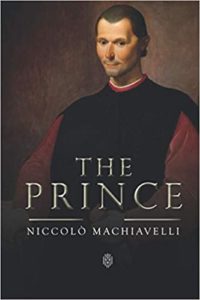
Favorite Quote
“Everyone sees what you appear to be, few experience what you really are.” — Niccolò Machiavelli
The Book in One Sentence
The Prince is a 16th century political treatise famous for condoning, even encouraging, evil behavior amongst political rulers in order for them to stay in power.
Why should you read it?
In my mind, this book is something akin to a big “BEWARE” sign. You read it. You understand how people in power can easily abuse it. And you’ll be much less likely to become the victim of power schemes in the future. Don’t think of this as an instruction manual, for it’ll only lead you down a dark path. Treat it with care, however, and it will be enlightening.
Key Takeaways
- Countries can be easy to conquer but hard to rule or vice versa – and markets are the same.
- If a country truly wants to protect itself, it needs its own army, not mercenaries. The same holds true for businesses.
- If you want to run a business, you have to assemble your advisors and know when to listen to them.
If you want to learn more, you can read our free four-minute summary or get a copy for yourself.
_____
24. The Ethics of Ambiguity by Simone de Beauvoir
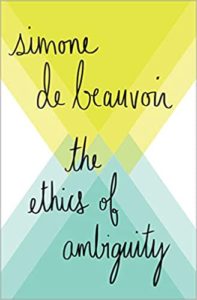
Favorite Quote
“We are having a hard time living because we are so bent on outwitting death.” — Simone de Beauvoir
The Book in One Sentence
The Ethics of Ambiguity explains existentialist philosophy in a post–World War II setting, showing us how we can accept the absurdity of life and use its randomness to create rather than despair.
Why should you read it?
Philosophy, like many other fields and book-writing in general, has historically been dominated by men. How refreshing to get a woman’s perspective. On existentialism, one of the most relevant and, arguably, useful philosophies, no less. If you’re looking for an introduction into existentialism and/or some background on one of history’s best female philosophers, pick this one.
Key Takeaways
- You’re freer than you think, and you should take advantage of it.
- There is no such thing as a completely neutral perspective.
- Abstract ideals aren’t as important as real people, but our governments mess this up all the time.
If you want to learn more, you can read our free four-minute summary or get a copy for yourself.
_____
25. The Better Angels of Our Nature by Steven Pinker
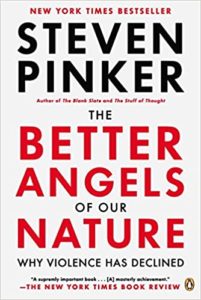
Favorite Quote
“As one becomes aware of the decline of violence, the world begins to look different. The past seems less innocent; the present less sinister.” — Steven Pinker
The Book in One Sentence
The Better Angels of Our Nature proves that we live in the most peaceful time in history, taking us through several major shifts that led to a global reduction in crime, explaining what motivates us to behave violently, and showing that these motivators are far outweighed by our naturally peaceful tendencies.
Why should you read it?
It’s easy to feel depressed. All you have to do is turn on the news. But despite all the bad reporting, when you zoom out on the timeline, the world is doing better than it ever has. If you’re looking for hope, optimism, and more faith in humanity, this is the one to read.
Key Takeaways
- Ideologies always start out with good intentions, but they can quickly deteriorate into promoting violence.
- The Flynn effect increases humanity’s ability to reason over time, thus making us less violent.
- Thanks to the invention of the printing press, humanitarian philosophy could spread, which decreased violence across the board.
If you want to learn more, you can read our free four-minute summary or get a copy for yourself.
_____
Best Philosophy Books for Productivity
26. Essentialism by Greg McKeown
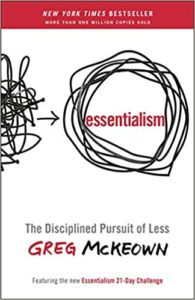
Favorite Quote
“Remember that if you don’t prioritize your life someone else will.” — Greg McKeown
The Book in One Sentence
Essentialism will show you a new, better way of looking at productivity by giving you permission to be extremely selective about what’s truly essential in your life and then ruthlessly cutting out everything else.
Why should you read it?
Most productivity books are just collections of common-sense tips. This one offers a fully fledged out philosophy for how to get things done, both in work and in life. That’s what makes this book so refreshing. It also shows you what philosophy looks like when we extend it beyond its usual, often academically influenced confines. All around a fantastic book!
Key Takeaways
- Doing nothing and doing everything are both signs of learned helplessness.
- Become the editor of your own life with the 90% rule.
- Always give yourself a time buffer of 50%.
If you want to learn more, you can read our free four-minute summary or get a copy for yourself.
_____
27. Deep Work by Cal Newport
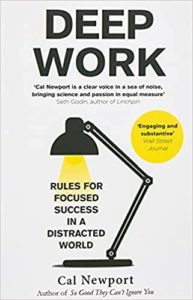
Favorite Quote
“If you don’t produce, you won’t thrive — no matter how skilled or talented you are.” — Cal Newport
The Book in One Sentence
Deep Work proposes that we have lost our ability to focus deeply and immerse ourselves in a complex task, showing us how to cultivate this skill again and manage our attention better than ever before thanks to four simple rules.
Why should you read it?
If you struggle to focus and feel like you can barely hold your attention together, read this book. It’s one of few productivity books presenting a coherent worldview, and that’s what makes it one of the best.
Key Takeaways
- There are four strategies for deep work, all of which require intention.
- Productive meditation can help you work more deeply, even while you’re taking a break.
- Stop working at the same time each day.
If you want to learn more, you can read our free four-minute summary or get a copy for yourself.
_____
28. The Power of Full Engagement by Jim Loehr & Tony Schwartz
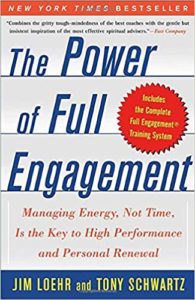
Favorite Quote
“We grow the aspects of our lives that we feed — with energy and engagement — and choke off those we deprive of fuel. Your life is what you agree to attend to.” — Jim Loehr & Tony Schwartz
The Book in One Sentence
The Power of Full Engagement will show you how to manage the only thing worth managing – your energy – by teaching you how to properly maintain the four kinds of energy, accept your limitations, and live a life of purpose.
Why should you read it?
Are you struggling to balance the various areas of life demanding your time and energy? Then this book is for you. It’s also not a philosophy book per se, but it presents a model you can use to navigate all of life. Plus, the energy management concept is just fascinating. Worth checking out!
Key Takeaways
- Manage your energy, not your time.
- Keep track of all four sources of energy in your life.
- Accept your limitations.
If you want to learn more, you can read our free four-minute summary or get a copy for yourself.
_____
Best Philosophy Books for Modern Life
29. Principles by Ray Dalio
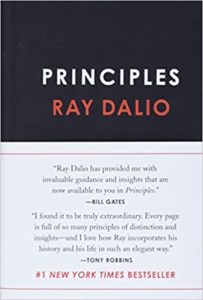
Favorite Quote
“The happiest people discover their own nature and match their life to it.” — Ray Dalio
The Book in One Sentence
Principles outlines and breaks down the set of rules for work and life that billionaire investor Ray Dalio, CEO of the world’s largest hedge fund, has acquired throughout his 40-year career in finance.
Why should you read it?
This book is part biography, part career advice, and part philosophical manual. Dalio put everything he had into it, and it shows. It has a lot to offer, and even if you’re not the biggest philosophy nut yet, you’ll gain a lot from Dalio’s vast life experience. The book is also quite moving, so there’s a strong emotional component as well. Check out Ray Dalio’s other books when you’re done!
Key Takeaways
- Principles are powerful weapons in the fight against flawed thinking.
- Radical truthfulness and transparency are two of Ray’s most important ideas.
- Great businesses use principles to create environments where the best ideas win.
If you want to learn more, you can read our free four-minute summary or get a copy for yourself.
_____
30. 12 Rules for Life by Jordan Peterson
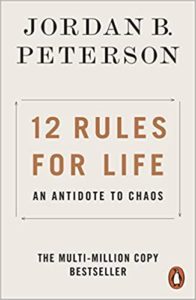
Favorite Quote
“It’s all very well to think the meaning of life is happiness, but what happens when you’re unhappy? Happiness is a great side effect. When it comes, accept it gratefully. But it’s fleeting and unpredictable.” — Jordan Peterson
The Book in One Sentence
12 Rules for Life is a story-based, stern yet entertaining self-help manual for young people laying out a set of simple rules to help us become more disciplined, behave better, act with integrity, and balance our lives while enjoying them as much as we can.
Why should you read it?
Love or hate Jordan Peterson, the man has a way with words. In this case, he uses his calm yet convincing voice to provide essential life advice to young people. The advice makes sense, and the stories are inspiring. All around, this is a book worth peeking into.
Key Takeaways
- Sweep in front of your own door before pointing out that the street is dirty.
- Treat yourself like a child you’re responsible for.
- Aim to do what is meaningful, not convenient.
If you want to learn more, you can read our free four-minute summary or get a copy for yourself.
_____
31. Minimalism by Joshua Fields Millburn & Ryan Nicodemus
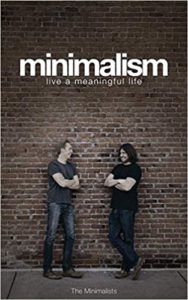
Favorite Quote
“You needn’t settle for a mediocre life just because the people around you did.” — Joshua Fields Millburn & Ryan Nicodemus
The Book in One Sentence
Minimalism is an instructive introduction to the philosophy of less, and how it helped two guys who had achieved the American dream let go of their possessions and the depressions that came with them.
Why should you read it?
Minimalism is one of few modern-day, standalone philosophies. That alone makes this book worth reading. More so, however, it has a chance at making you happier. Caring less about possessions is a wonderful way of making room for what’s truly important in your life, and this book explains this life approach extremely well.
Key Takeaways
- Debt goes first. Get rid of your financial crutches to finally feel free.
- Use the TARA method to become more accepting of other people in your life.
- You are not your job. Don’t let your work define you.
If you want to learn more, you can read our free four-minute summary or get a copy for yourself.
_____
32. Digital Minimalism by Cal Newport
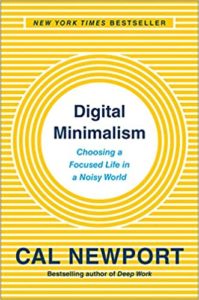
Favorite Quote
“Focus your online time on a small number of carefully selected and optimized activities that strongly support things you value, and then happily miss out on everything else.” — Cal Newport
The Book in One Sentence
Digital Minimalism shows us where to draw the line with technology, how to properly take time off our digital devices, and why doing so is the key to living a happy, focused life in a noisy world.
Why should you read it?
We have so much more technology than we did even 20 years ago, and yet, no one has updated philosophy to help us acknowledge this fact. Well, no one except Cal Newport. If you struggle to find the line between your screen and reality, this book will provide plenty of tips and tactics but also some powerful arguments as to why spending less time online matters.
Key Takeaways
- Digital minimalism centers on 3 principles: clutter is costly, optimization is vital, and intentionality is satisfying.
- Plan downtime events as a source of inward joy and deep contemplation.
- Quick fixes and “life hacks” might prompt a healthy new habit, but they don’t promote sustainable change.
If you want to learn more, you can read our free four-minute summary or get a copy for yourself.
_____
33. Kaizen by Sarah Harvey
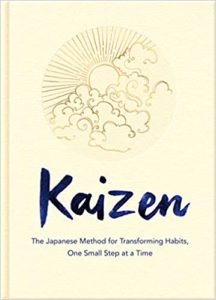
Favorite Quote
“Change is infectious and when success is achieved in one area, you are encouraged to apply the same techniques to another area of your life.” — Sarah Harvey
The Book in One Sentence
Kaizen is the Japanese philosophy of “continuous improvement,” which is often used in business but can also be applied to personal growth, offering us a path to self-improvement that’s less plagued by pressure and anxiety and more marked by small, daily steps adding up to incremental but meaningful progress.
Why should you read it?
If you feel overwhelmed by all the positive changes you’re hoping to make in your life, stop and read this book. This refreshing philosophy gives us permission to take it slowly, to live our lives one day at a time and yet still feel good about them. Everything is going well when you improve a little every day — what a comforting philosophy to live by!
Key Takeaways
- Kaizen is a Japanese philosophy centered around incremental growth, and it begins with evaluating your habits.
- The best way to reach a big goal is to start with a step so small, you’ll barely notice the difference.
- Review your habits regularly to track your progress.
If you want to learn more, you can read our free four-minute summary or get a copy for yourself.
_____
34. The Subtle Art of Not Giving a F*ck by Mark Manson
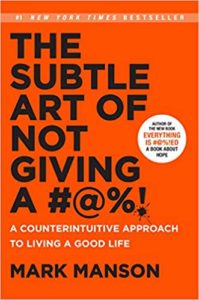
Favorite Quote
“Who you are is defined by what you’re willing to struggle for.” — Mark Manson
The Book in One Sentence
The Subtle Art of Not Giving a F*ck does away with the positive psychology craze to instead give you a Stoic, no-BS approach to living a life that might not always be happy, but that will be meaningful and centered only around what’s important to you.
Why should you read it?
Are you tired of the constant prompts to be positive and put on a smile? Then this is the book for you. Manson has managed to evolve nihilism — a philosophy in which nothing matters and that commonly makes people depressed — into something meaningful: a world in which very few things matter, but the ones that do are really, really important. An absolute mega-bestseller of a book, full of humor and sound advice. Definitely a recommended read.
Key Takeaways
- Values you can’t control are bad values to follow.
- Don’t believe you know anything with certainty; it keeps you from improving.
- Trying to leave a legacy might ruin your life.
If you want to learn more, you can read our free four-minute summary or get a copy for yourself.
_____
35. The Power of Now by Eckhart Tolle
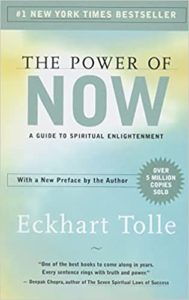
Favorite Quote
“Time isn’t precious at all, because it is an illusion. What you perceive as precious is not time but the one point that is out of time: the Now. That is precious indeed. The more you are focused on time — past and future — the more you miss the Now, the most precious thing there is.” — Eckhart Tolle
The Book in One Sentence
The Power of Now shows you that every minute you spend worrying about the future or regretting the past is a minute lost, because the only place you can truly live in is the present, the now, which is why the book offers actionable strategies to start living every minute as it occurs and becoming 100% present in and for your life.
Why should you read it?
If you feel like reality keeps letting you down, perhaps you’re not spending enough time in it. Of course we get sad when we constantly think about the past or the future! This book will remedy that problem. If you’re a mindfulness skeptic or feel burned out, this book might provide just the new perspective you need.
Key Takeaways
- Life is just a series of present moments.
- All pain is a result of resistance to the things you cannot change.
- You can free yourself from pain by constantly observing your mind yet not judging your thoughts.
If you want to learn more, you can read our free four-minute summary or get a copy for yourself.
_____
Conclusion
Tim Ferriss once came close to committing suicide. The thing he credits for successfully climbing out of the hole, not returning, and managing his depression a lot better since then? Philosophy! Stoicism, in his case. Tim calls it “an operating system for thriving in high-stress environments; for making better decisions.”
Thanks to people like him, Ryan Holiday, and others, this set of ancient ideas from a few good thinkers is seeing a resurgence. Whichever particular philosophy you find most helpful in living your life, however, only you can find out. At the end of the day, it doesn’t matter whether we connect more with Stoicism, existentialism, or even the ideals promoted in Star Wars. What matters is that we find a set of life rules that works for us.
I hope our list of the best philosophy books will help you do just that. Pick a title, start learning, and remember what William James said: “Philosophy is at once the most sublime and the most trivial of human pursuits.”
Other Book Lists by Topic
Looking for more of the best books on various topics? Here are all the book lists we’ve made for you so far:
- The 60 Best Business Books of All Time (Will Forever Change How You Think About Organizations)
- The 20 Best Entrepreneurship Books to Start, Grow & Run a Successful Business
- The 14 Best Finance Books of All Time
- The 21 Best Habit Books of All Time to Change Any Behavior
- The 33 Best Happiness Books of All Time That Everyone Should Read
- The 60 Best History Books of All Time (to Read at Any Age)
- The 7 Best Inspirational Books That Will Light Your Inner Fire
- The 40 Best Leadership Books of All Time to Help You Become a Truly Inspiring Person
- The 31 Best Motivational Books Ever Written
- The 12 Best Nonfiction Books Most People Have Never Heard Of
- The 35 Best Philosophy Books to Live Better and Become a Great Thinker
- The 34 Best Psychology Books That Will Make You Smarter and Happier
- The 25 Best Sales Books of All Time to Help You Close Any Deal
- The 33 Best Self-Help Books of All Time to Read at Any Age
- The 22 Best Books About Sex & Sexuality to Improve Your Love Life & Relationships
- The 30 Most Life-Changing Books That Will Shift Your Perspective & Stay With You Forever
Other Book Lists by Author
Looking for more books by the world’s most celebrated authors? Here are all of the book lists by the author we’ve curated for you:
- All Brené Brown Books, Sorted Chronologically (and by Popularity)
- Jordan Peterson Books: All Titles in Order of Publication + The 5 Top Books He Recommends
- All Malcolm Gladwell Books, Sorted Chronologically (and by Popularity)
- All Michael Pollan Books, Sorted Chronologically (and by Popularity)
- Peter Thiel Books: A Comprehensive List of Books By, About & Recommended by Peter Thiel
- All Rachel Hollis Books: The Full List of Non-Fiction, Fiction & Cookbooks, Sorted by Popularity & the Best Reading Order
- All Ray Dalio Books, Sorted Chronologically (and by Popularity)
- All Robert Greene Books, Sorted Chronologically (and by Popularity)
- All Ryan Holiday Books, Sorted Chronologically (and by Popularity)
- All Simon Sinek Books, Sorted Chronologically (and by Popularity)
- All Tim Ferriss Books, Sorted Chronologically (and by Popularity)
- All Walter Isaacson Books, Sorted Chronologically (and by Popularity)
Last Updated on February 20, 2023